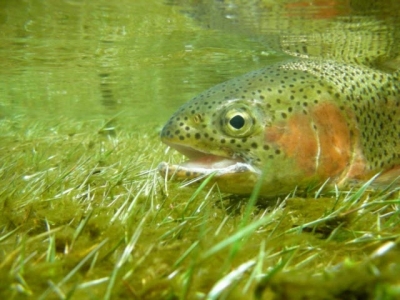What dietary intervention can relieve stress for farmed trout?

The use of betulinic acid in trout feed may offer a natural trout calming agent, say researchers.
An international team of researchers from Canada and Costa Rica examined the use of betulinic acid (BA) in trout diets as a way to mitigate stress in farmed rainbow trout. They reported their findings in the journal Aquaculture.
“The present study investigated the potential for cortisol-lowering effects of S. sympetala extracts and BA in rainbow trout, Oncorhynchus mykiss,” they said.
The authors said they employed in vitro method to see if BA could reduce cortisol biosynthesis and then they carrried out a feeding trial to determine if a BA-supplemented diet would alter the cortisol response.
The group found that including the bioactive extract from the anxiolytic plant Souroubea sympetala had reduced plasma cortisol responses with minimal, or no, report of cytotoxicity, said the researchers.
“These findings suggest that BA is of potential use in mitigating effects of exposure to the stressors commonly encountered in an aquaculture setting,” they concluded.
Why betulinic acid?
Aquaculture production can offer multiple stresses for fish including handling, sorting, transport, grading and use of a high stocking density, said the researchers. Those practices can increase levels of stress hormones like catecholamine, glucocorticoid or cortisol.
The increase in stress hormones may result in slowed growth rates, worse immune function and limited reproduction, they said.
“The continuing and rapid growth of the aquaculture industry worldwide (FAO, 2014), together with increasing consumer emphasis on food quality and safety, is driving interest in identifying and developing dietary strategies that promote health, growth, and resistance to stress and disease,” said the researchers. “Ensuring that diets meet nutritional requirements is of primary importance, but the potential benefits of dietary additives such as vitamins, probiotics, prebiotics and phytochemicals increasingly are being investigated.”
Plants from the genus Sourobubea sp. are part of a neotropical plant family traditionally used in the Amazon to treat an illness related to anxiety, they said. The leaves contain several triterpene and phenolic substances and betulinic acid is the primary bioactive principle.
“Recent work has demonstrated that extracts of Souroubea sympetala Gilg. exhibit significant and dose-dependent anxiolytic activity in rats tested in an elevated plus maze,” they said. Other trials have found that feeding it to rats also lowered blood corticosterone amounts in restrained rats, but not in untethered animals, they added.
Salmonid fish, like trout or salmon, are some of the most often farmed fish world-wide, said the researchers. “Identifying methods to reduce the deleterious effects of stress in these species is valuable in both commercial and animal welfare contexts,” they added.
Means and methods
In vitro testing was done using a sample of the rainbow trout harvested for their head kidney, said the researchers. Solutions testing the reactions when an S. sympetala extract or BA were present were analyzed for cortisol production.
In the experiment, female, juvenile rainbow trout were given a diet supplemented with 1mg kg-1 BA for a period of six days after an acclimation period, said the researchers. The control diet was a commercial trout pellet with the added BA.
The BA was extracted from samples of wild S. sympetala harvested in Costa Rica, they said.
At the end of the feeding trial, a set of fish was collected from each tank for blood samples, said the researchers. Remaining fish were subjected to a confinement stressor and blood samples were taken.
Results
Rainbow trout head kidney tests with 10, 30 or 100 μg mL− 1S. sympetala extract had reduced cortisol production compared to the control, as did preparations with 3, 10, 30 or 100 μg mL− 1 BA, said the researchers. “Incubation with BA also had a significant effect on cell viability,” they added.
“The findings of the present study suggest that BA or S. sympetala could be of benefit in routine aquaculture procedures known to induce a cortisol response in fish, including transport, handling and grading,” they said.
However, in the feeding trial, an interaction between the BA supplement and stressor was found, they said. Baseline circulating cortisol concentration were lower for fish on the control diet.
“Exposure to a net restraint stressor significantly elevated plasma cortisol concentrations in both control fish and fish fed the BA-supplemented diet,” said the researchers. “However, stress-induced cortisol concentrations in trout fed the BA-supplemented diet were significantly lower than those of trout maintained on the control diet.”
Related news
Tools

Phối trộn thức ăn chăn nuôi

Pha dung dịch thủy canh

Định mức cho tôm ăn

Phối trộn phân bón NPK

Xác định tỷ lệ tôm sống

Chuyển đổi đơn vị phân bón

Xác định công suất sục khí

Chuyển đổi đơn vị tôm

Tính diện tích nhà kính

Tính thể tích ao



 What fats offer the best response in salmon…
What fats offer the best response in salmon…  Amaranth leaf offers potential protein for fishmeal replacement
Amaranth leaf offers potential protein for fishmeal replacement